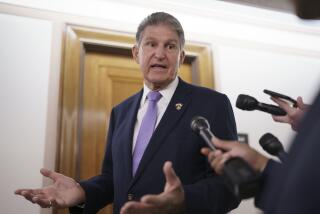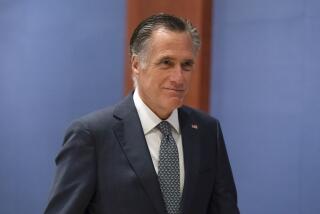Bush Blesses Charity Plan
- Share via
WASHINGTON — A coalition of Democratic and Republican senators won White House support Thursday for a compromise version of President Bush’s proposal to give religious groups a bigger role--and more federal aid--in providing social services.
The agreement revives the plan, which stalled last year in the Senate. Its passage would put in place one of Bush’s domestic priorities, one of the first he advanced after his inauguration.
The program has a new name that tones down its religious aspect. What the White House originally called the Faith-Based Initiative has become the Armies of Compassion Initiative. And it has a more modest reach. Rather than being open-ended, most of its provisions would have a two-year life unless renewed.
The compromise proposal also eliminates controversial elements of the plan that passed the House last year on a largely party-line vote.
The House measure would exempt religion-based programs from civil rights laws and would let them make personnel decisions, based on religion, in programs operating with federal assistance. They would be exempt from local laws protecting the rights of gays and lesbians.
Those elements are not included in the Senate measure.
Rep. J.C. Watts Jr. (R-Okla.), sponsor of the measure that the House approved, called the Senate proposal a “good start.” He called for greater leeway for religious organizations but said he is confident that differences between the Senate measure, if approved, and the House legislation can be overcome.
During a photo session in the Oval Office with the senators who helped negotiate the compromise, Bush said: “This legislation will not only provide a way for government to encourage faith-based programs to exist without breaching the separation of church and state, it will also encourage charitable giving as well.”
He called the measure “a big step” toward harnessing the nation’s compassionate nature.
The measure is intended to allow religious organizations to use federal support to take part in such activities as tutoring, helping the homeless, helping the families of prisoners and meeting other social needs without running afoul of the constitutional prohibition on the mingling of religion and government.
White House Press Secretary Ari Fleischer said the measure “breaks down barriers where the federal government previously did not provide help to community or faith-based groups that were doing good works in their neighborhoods.”
The legislation would allow groups receiving federal aid to display religious symbols on walls or use religious phrases in their names. That sparked criticism from the Rev. Barry Lynn of Americans United for Separation of Church and State.
“It is simply wrong for a publicly funded job-training facility to post a banner that reads, ‘Only Jesus saves,’ ” he said.
Several senators said they hope the measure will help overcome what some are calling a crisis among smaller charities. The agencies have reported a slump in gifts after the Sept. 11 terrorist attacks because many donors are contributing to charities created to help the victims.
Catholic Charities, for example, reported in December that contributions in the Los Angeles metropolitan area had declined 50% to 60% since Sept. 11.
White House officials and the senators said one of the measure’s key elements would let people who do not itemize deductions on their income tax returns to deduct up to $400 in charitable contributions--or $800 for those filing joint returns--in 2002 and 2003. The administration says approximately 75% of taxpayers do not itemize deductions.
This provision, administration officials said, would encourage charitable deductions among a wide swath of low- and moderate-income people.
Sen. Joseph I. Lieberman (D-Conn.), a chief sponsor of the bill, said, “That should unleash billions of dollars of charitable giving.”
Another leading sponsor is Sen. Rick Santorum (R-Pa.).
Under Senate projections, the measure would cost the federal treasury from $11 billion to $13 billion, most of it through the tax deductions. The White House put the cost at $10 billion to $12 billion.
Among other provisions, the legislation would increase the tax breaks for corporate donations to charities. It also would allow donations from individual retirement accounts without tax penalties after the taxpayer reaches age 67.
More to Read
Sign up for Essential California
The most important California stories and recommendations in your inbox every morning.
You may occasionally receive promotional content from the Los Angeles Times.













